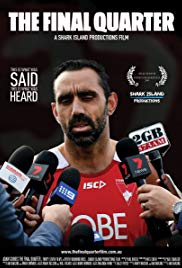
THE FINAL QUARTER
Australia, 2019, 75 minutes, Colour.
Adam Goodes.
Directed by Ian Darling.
In 2019, two films were made about AFL player, Adam Goodes. The Final Quarter was shown at the Sydney Film Festival and on channel 10. The other film, The Australian Dream, was screened at the Melbourne Film Festival and then had a commercial release.
For Australian audiences, both films serve as something of an examination of conscience. Adam Goodes was one of many AFL players with indigenous backgrounds – the time of the making of these films, 71 professional indigenous AFL players.
For overseas audiences, the offence depicted in these films might come to a something of a shock, the continued billing of Adam Goodes during matches, as well as racist verbal attacks, controversies in the media, the psychological pressure on goods and his finally retiring from the game. And, at the centre of the controversies, he was named as Australian of the Year, 2014.
This film has many sequences, dates and opponents, of various games from 2014 to 2016. There is plenty of opportunity to see goods and his talent on the field. He is also particularly articulate, in his making speeches, in making message videos. He acquitted himself with dignity as Australian of the Year.
While there were many commentators who are supportive of goods, and he received strong support from his mother who designed jerseys for the indigenous matches, there are quite a number of prominent names, considered Conservative (Andrew Bolt, Miranda Devine, Alan Jones) and it particularly of noxious television commentator, former player, Sam Newman, whose TV rents and accusations are featured in this film.
These years raised questions of how racist Australians were, attitudes towards indigenous people (for many a tolerance when they knew their place), outbursts, the episode of the young girl who called out a monkey epithet to Goodes and he challenged her and she was removed from the grounds, with the conservative commentators criticising him for this – while the film reminds audiences that he spoke very strongly to ask for help for the girl, that was not her fault, that this was the atmosphere in which she had grown up. There were further attacks and, prominent television broadcaster, Eddie McGuire?, made a rash joke about Adam Goodes and King Kong, apologising but finding it hard to live down.
Goodes emerges from this film as a man with dignity, put upon, personally vilified at a time when other indigenous players were not. It is difficult in retrospect to understand why he was so targeted and how this targeting was contagious, month after month, for some years.
A lot of discussion, a lot of commentators, material presented for the assessment of the audience – and the challenge to the AFL and the apologies from leaders that they should have stepped in earlier to prevent the targeting of the building, but which contributes to a continued examination of conscience by all Australians.